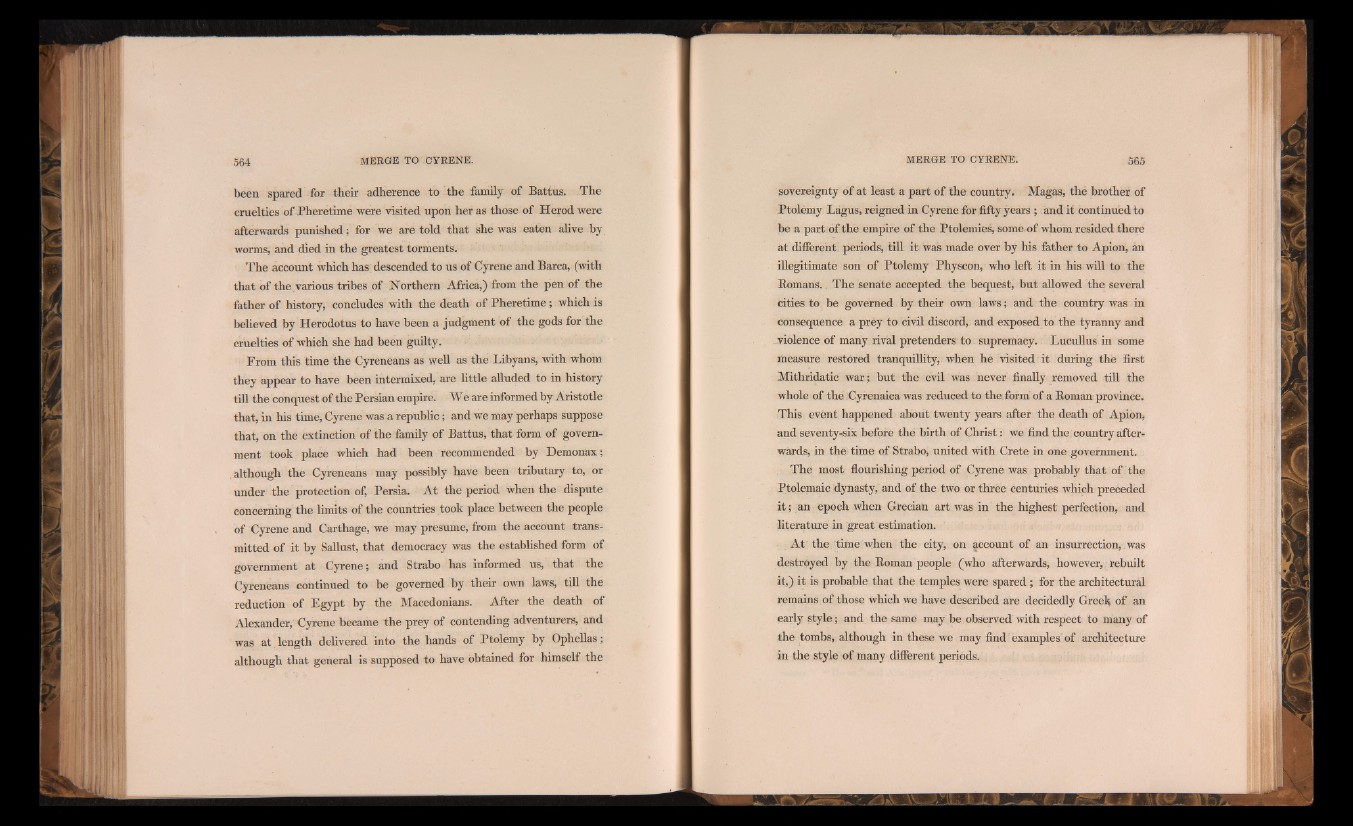
been spared for their adherence to the family of Battus. The
cruelties of Pheretime were visited upon her as those of Herod were
afterwards punished ; for we are told that she was eaten alive by
worms, and died in the greatest torments.
The account which has descended to us of Cyrene and Barca, (with
that of the various tribes of Northern Africa,) from the pen of the
father of history, concludes with the death of Pheretime; which is
believed by Herodotus to have been a judgment of the gods for the
cruelties of which she had been guilty.
From this time the Cyreneans as well as the Libyans, with whom
they appear to have been intermixed, are little alluded to in history
till the conquest of the Persian empire. We are informed by Aristotle
that, in his time, Cyrene was a republic; and we may perhaps suppose
that, on the extinction of the family of Battus, that form of government
took place which had been recommended by Demonax;
although the Cyreneans may possibly have been tributary to, or
under the protection of, Persia. A t the period when the dispute
concerning the limits of the countries took place between the people
of Cyrene and Carthage, we may presume, from the account transmitted
of it by Sallust, that democracy was the established form of
government at Cyrene; and Strabo has informed us, that the
Cyreneans continued to be governed by their own laws, till the
reduction of Egypt by the JVfacedonians. After the death of
Alexander, Cyrene became the prey of contending adventurers, and
was at length delivered into the hands of Ptolemy by Ophelias;
although that general is supposed to have obtained for himself the
sovereignty of at least a part of the country. Magas, the brother of
Ptolémy Lâgus, reigned in Cyrene for fifty years ; and if continued to
be a part of the empire of the Ptolemies, some-of whom resided there
at different periods, till it was made over by his father to Apion, an
illegitimate son of Ptolemy Physcon, who left it in his will to the
Romans.. The senate accepted the bequest, but allowed the several
cities to be governed by their own laws; and the country was in
consequence' a préy to civil discord, and exposed to the tyranny and
^violence of many rival pretenders to supremacy. Lucullus in some
measure restored tranquillity, when he visited it during the first
Mithridatic war; but the evil was never finally removed till the
whole of the Cyrenaica was reduced to the form of a Roman province.
This evènt happened about twenty years after the death of Apion,
and seventy-six before the birth of Christ : we find the country afterwards,
in the time of Strabo, united with Crete in one government.
The most flourishing period of Cyrene was probably that of the
Ptolemaic dynasty, and of the two or three centuries which preceded
it; an epoch when Grecian art was in the highest perfection, and
literature in great estimation.
At the time when the city, on Recount of an insurrection, was
destroyed by the Roman people (who afterwards, however, rebuilt
it,) it is probable that the temples were spared ; for the architectural
remains of those which we have: described are decidedly Greek of an
early style ; and the same may be observed with respect to many of
the tombs, although in these we may find examples'of architecture
in the style of many different periods.